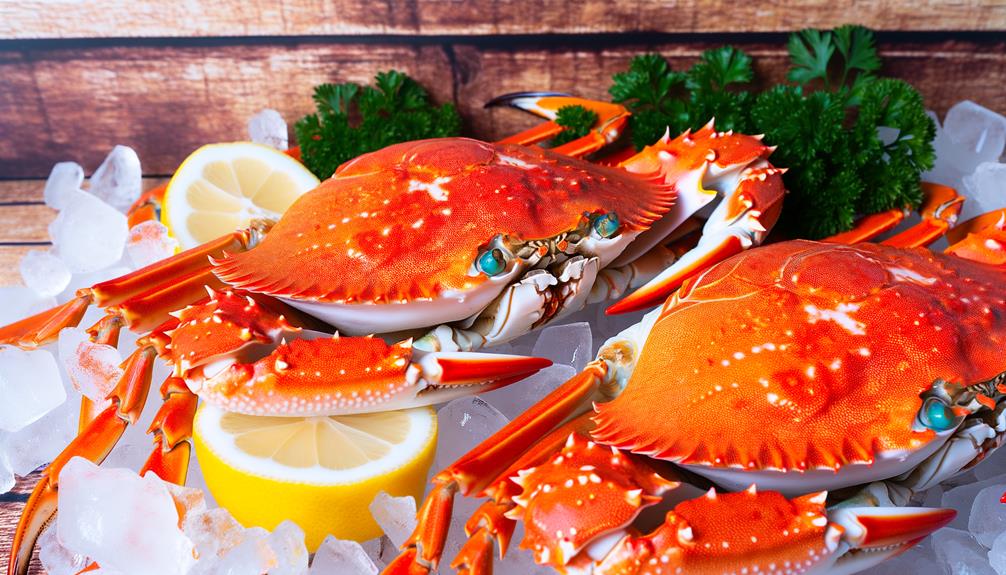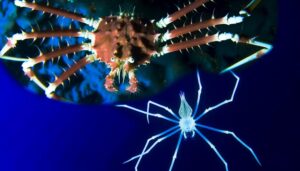Alaskan Crab vs Snow Crab: Detailed Comparison of 5 Key Differences
You’ll find Alaska snow crab offers a substantial 19 grams of protein per 100 grams, supporting diverse amino acid intake. With less than 1 gram of fat and about 90 calories per 3-ounce serving, it’s ideal for health-conscious diets.
Rich in omega-3 fatty acids, it aids cardiovascular and cognitive functions. Essential nutrients like vitamin B12, selenium, magnesium, iron, and copper bolster neurological health, immune function, and energy production.
Its high digestibility and minimal fat profile make it an excellent nutritional choice. To explore the full spectrum of benefits and nutritional details, keep going because there’s much more to discover.

Key Takeaways
- Alaska snow crab provides 19 grams of protein per 100 grams of meat.
- It contains less than 1 gram of fat per 100 grams, with healthy unsaturated fats.
- A 3-ounce serving of snow crab contains approximately 90 calories.
- Rich in omega-3 fatty acids, snow crab supports heart health and reduces inflammation.
- Snow crab is a good source of Vitamin B12, selenium, magnesium, iron, and copper.
Alaska Snow Crab Nutrition Overview per 3 oz Serving
| Nutrient | Amount per 3 oz (85g) Serving |
|---|---|
| Calories | 90 |
| Protein | 19g |
| Total Fat | 1g |
| Saturated Fat | 0g |
| Cholesterol | 45mg |
| Sodium | 300mg |
| Total Carbohydrates | 0g |
| Dietary Fiber | 0g |
| Sugars | 0g |
| Vitamin B12 | 100% DV |
| Selenium | 60% DV |
| Zinc | 10% DV |
| Omega-3 Fatty Acids | 200mg |
Protein Content
Alaska snow crab offers a significant protein content, providing approximately 19 grams of protein per 100 grams of meat. This high protein content is vital for muscle repair, enzymatic functions, and overall metabolic processes.
You’ll find that the essential amino acid profile of snow crab is well-balanced, making it an excellent choice for supporting tissue growth and maintenance. The digestibility of crab protein is also high, ensuring efficient absorption and utilization by your body.
Scientific studies highlight that protein from marine sources like Alaska snow crab can contribute to a more diverse and beneficial amino acid intake compared to terrestrial sources. Consuming this protein-rich seafood supports not only physical health but also biochemical pathways essential for daily functioning.
Low-Fat Profile
You’ll appreciate that snow crab meat is remarkably low in fat, containing less than 1 gram of fat per 100 grams of serving. This ultra-low-fat profile makes it an exceptional choice for those aiming to reduce dietary fat intake.
Scientific analysis confirms that the minimal fat content comprises primarily healthy unsaturated fats, which can support cardiovascular health. Additionally, snow crab meat is devoid of trans fats, further enhancing its nutritional desirability.
The low-fat content is also beneficial for weight management, as it allows you to enjoy a flavorful protein source without the associated caloric burden of higher-fat seafood. By integrating snow crab into your diet, you’re aligning with evidence-based nutrition practices that prioritize lean, heart-healthy food options.
Caloric Value
When considering the caloric value of Alaska snow crab, you’ll find it provides approximately 90 calories per 3-ounce serving.
This low-calorie content can be advantageous for weight management and overall health.
Calories per Serving
A standard serving of Alaska snow crab contains approximately 100 calories, providing a nutrient-dense option for those mindful of their caloric intake. This serving size typically includes about 85 grams of crab meat, which offers a balanced macronutrient composition.
The caloric content derives primarily from high-quality protein and minimal fat. Specifically, you’ll get around 20 grams of protein and only 1.5 grams of fat per serving, ensuring efficient muscle repair and sustained energy without excessive caloric surplus.
Additionally, the low carbohydrate content, generally less than 1 gram, makes this an excellent choice for various dietary regimes.
Low-Calorie Benefits
Leveraging the low-calorie profile of Alaska snow crab, you can effectively manage your weight while still reaping the nutritional benefits of high-quality protein and essential nutrients.
Each 3-ounce serving contains approximately 70 calories, making it an excellent choice for those monitoring their caloric intake. The high protein content—about 15 grams per serving—promotes satiety, reducing the likelihood of overeating.
Additionally, snow crab is rich in vitamins and minerals, including vitamin B12 and selenium, which play vital roles in metabolic function and immune support.
Omega-3 Fatty Acids
Among the nutritional benefits of Alaska snow crabs, their high content of omega-3 fatty acids stands out for its significant role in cardiovascular health. These essential fatty acids, particularly EPA (eicosapentaenoic acid) and DHA (docosahexaenoic acid), help reduce inflammation, lower blood pressure, and decrease triglyceride levels.
Consuming snow crab provides you with these nutrients, which are essential for maintaining heart health and preventing chronic diseases. Research indicates that omega-3s also support brain function and may reduce the risk of cognitive decline.
Vitamin B12
Vitamin B12, an essential nutrient found in Alaska snow crabs, plays a pivotal role in maintaining nerve function and producing red blood cells. This nutrient is critical for DNA synthesis and neurological health. Consuming Alaska snow crabs can greatly contribute to your daily B12 intake.
Here’s why vitamin B12 is essential:
- Nerve Function: Vitamin B12 helps in the formation of myelin, the protective sheath around nerves, guaranteeing efficient neural transmission.
- Red Blood Cells: It aids in the production of red blood cells, preventing anemia and supporting oxygen transport.
- DNA Synthesis: B12 is crucial for DNA replication and repair, which are necessary for cell division and overall health.
Including Alaska snow crabs in your diet guarantees you receive these key benefits.
Selenium Benefits
Selenium, a powerful antioxidant found in Alaska snow crabs, plays a pivotal role in protecting cells from oxidative damage and supporting immune function. This essential trace mineral helps regulate thyroid hormone metabolism and enhances DNA synthesis. Consuming selenium-rich snow crab can greatly bolster your antioxidant defense system.
Here’s a detailed table summarizing selenium’s benefits:
| Benefit | Mechanism | Result |
|---|---|---|
| Antioxidant Protection | Neutralizes free radicals | Reduced oxidative stress |
| Immune System Support | Enhances immune response | Improved disease resistance |
| Thyroid Function Regulation | Converts T4 to T3 hormone | Optimized metabolic processes |
Zinc Levels
You’ll find that Alaska snow crab is an excellent source of zinc, with each serving contributing greatly to your daily recommended intake. Zinc plays a vital role in bolstering your immune system, helping to fight off infections and illnesses.
Additionally, it accelerates wound healing by supporting cellular repair mechanisms.
Essential Immune Booster
Zinc, an essential mineral found in Alaska snow crab, plays a significant role in enhancing your immune system’s functionality. Zinc’s immunomodulatory action supports the body’s defense mechanisms, making it an essential nutrient for maintaining health.
Here are three key ways zinc from Alaska snow crab benefits your immune system:
- Boosts White Blood Cell Production: Zinc is vital for the development and function of neutrophils and lymphocytes, which are crucial for combating infections.
- Supports Antioxidant Function: Zinc acts as a cofactor for superoxide dismutase, an enzyme that protects cells from oxidative damage.
- Improves Immune Communication: Zinc facilitates cytokine production, enhancing cell signaling pathways essential for immune responses.
Promotes Wound Healing
Zinc from Alaska snow crab significantly speeds up wound healing by promoting cellular repair and regeneration. Zinc is a key cofactor in numerous enzymatic reactions involved in tissue repair. It enhances epithelialization, collagen synthesis, and protein synthesis, which are essential for wound closure.
Studies have shown that adequate zinc levels can reduce inflammation and oxidative stress, creating an ideal environment for healing. Consuming Alaska snow crab, with its high zinc content, ensures you’re getting a bioavailable form of this essential mineral. This can be particularly beneficial if you have a zinc deficiency, which can hinder wound healing.
Including this seafood in your diet can support your body’s natural healing processes, offering a flavorful and efficient way to boost recovery.
Magnesium Content
Alaska snow crabs contain a significant amount of magnesium, which plays an vital role in over 300 enzymatic reactions in your body. This essential mineral contributes to multiple physiological functions:
- Energy Production: Magnesium is essential for ATP synthesis, the molecule that provides energy to your cells.
- Nerve Function: It regulates neurotransmitter release, aiding in nerve signal transmission.
- Muscle Contraction: Magnesium balances calcium levels, preventing muscle cramps and spasms.
Consuming Alaska snow crabs can enhance your magnesium intake, supporting overall metabolic health.
Studies show that adequate magnesium levels are associated with reduced risks of cardiovascular diseases and improved bone density.
Iron and Copper
Iron and copper in Alaska snow crabs play pivotal roles in maintaining your body’s essential physiological processes, including oxygen transport and enzymatic functions. Iron is integral to hemoglobin, which facilitates oxygen delivery to tissues.
A 3-ounce serving of snow crab provides approximately 1.5 milligrams of iron, helping meet your daily requirements. Copper, essential for iron metabolism and the formation of red blood cells, is also abundant. You’ll get around 0.4 milligrams of copper per serving, contributing to the recommended daily intake.
These trace minerals support enzymatic activities that are vital for energy production and neurotransmitter synthesis. Consuming Alaska snow crabs can bolster your micronutrient intake, promoting overall health and reducing risks associated with deficiencies.
Conclusion
By savoring Alaska snow crab, you’re not just indulging in a culinary delight; you’re also treating your body to a nutritious powerhouse. With high protein, low fat, and rich omega-3s, it’s like a symphony of health benefits.
Packed with Vitamin B12, selenium, zinc, magnesium, and essential iron and copper, each bite fuels your energy. Don’t just eat—nourish. Let the sea’s bounty transform your meals into a celebration of well-being and robust health.






